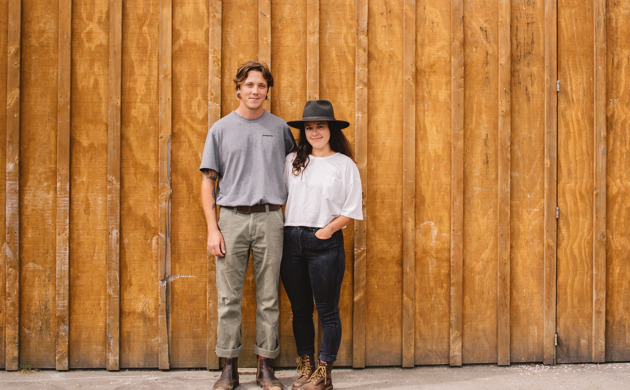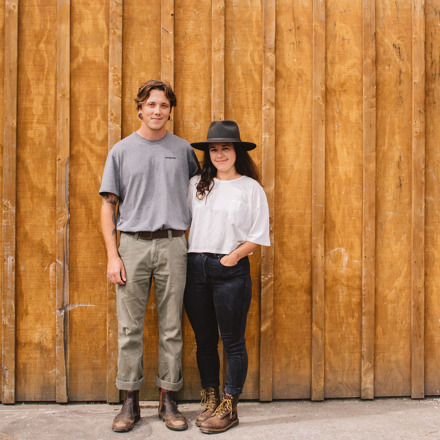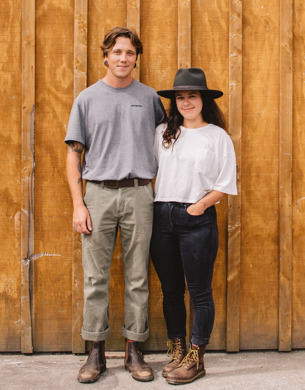Sophie Preece

Anne Escalle grew up believing the best moments in life involved a glass of wine. Decades on, the viticulturist leading Edmond de Rothschild Heritage’s New Zealand operations remains delighted by the conjuring of pleasure from soil and climate, ancient traditions and innovative science. “It’s my passion,” she says from a small cellar door at Rimapere vineyard in Marlborough. “I am pinching myself sometimes to realise I am not dreaming.”
The Bordeaux-based Rothschilds bought this vineyard in 2012 and named it in te reo Māori to signify the five arrows of their family emblem. The 24 hectare Sauvignon Blanc vineyard is managed with regenerative and organic principles, and each spring erupts into a field of legumes and blooms. Late last year Edmond de Rothschild Heritage also bought a 34.5ha Pinot Noir vineyard in Central Otago’s Bannockburn, with Akarua intended to help spearhead the company’s organic ambitions. They have nine vineyards around the world, and produce 3.5 million bottles of wine, but Rimapere, to be certified organic in 2024, and Akarua, set to produce 60,000 bottles when fully converted, will be their first foray into organic sales.
As General Manager, Anne is more often in market than midrow these days, but there’s metaphorical mud on her boots when she speaks of the wines, sharing the blood, sweat and magic behind every glass. Rimapere’s size allows her to “cross all the bridges,” she says. “To go from the soil through to pouring the wine and explaining that to the final consumer.”
Crossing bridges is something of a theme for this French-Kiwi merging traditional philosophies with innovative technologies, and finding a middle ground between the old world and the new. But she has both boots happily at home on New Zealand soil, she says. “I found in New Zealand a way to be in balance with my family and myself, which maybe Europe didn’t offer to me 20 years ago. I found a place I can grow as a person.”
Anne was raised in a small village in the Rhône Valley, where her father was a solicitor and her parents worked together in their business. Her mother loved Champagne, her father had a well-stocked cellar, “and every family event was about food and wine”. Her grandparents were involved in agriculture, and on finishing school Anne directed her love of biology to the National School of Agricultural Engineering in Bordeaux. “When I got there, there were options, and one was wine,” she says with a smile. “I said ‘come on!’ If you can work with something you love and if you can make wine, why not?” She opted for a Master’s in Viticulture, Vinification, and Vineyard Management, and “never regretted it”, still delighted to be in a field “where you have pleasure, and you improve the pleasure of people”.
Anne carries that delight with her “all the time”, and on the day we speak is preparing for a gathering of Rimapere staff, who will eat cheese, taste wines and catch up on the vintage just past. “If we have fun and get pleasure out of what we do, I really feel it’s going in the bottle.”
Her studies revealed the place of science in winegrowing too, including through a six-month internship at Chateau Margaux in Bordeaux, where pheromone traps were being trialled for moths. “I am a scientist by training and my brain is always excited by new tools and new ways to understand better,” she says. After university Anne worked on a banana plantation in Cameroon, before returning to the Languedoc Roussillon region in France to consult to a range of vineyard operations, from traditional viticulture to more modern models, some using chemistry products and others biodynamic teas.
Anne soon realised that for all her education, the old winegrowers she worked with had much to teach her. “That’s been my best school,” she says, reflecting on the combined power of generational knowledge and science. As an example, she talks of the rich traditions of biodynamics, and the ability of science to look at its processes and outcomes in a different way. “To understand why it’s working.”
“If we have fun and get pleasure out of what we do, I really feel it’s going in the bottle.”
After a decade consulting, Anne and her husband Fred decided to move to New Zealand. “We are passionate people, and wanted careers we were passionate about, but to balance that with our family.” In 2007 she joined Winegrowers of Ara (now Bankhouse Estate) in Marlborough, one of the largest single estate operations in New Zealand. Developed by Dr Damian Martin and Jean Charles Van Hove, the 600ha vineyard focussed on marrying new technology with old world philosophy. “I loved every minute I spent on that vineyard”, Anne says, comparing her 12 years at Bankhouse – nine as viticulturist – to coaching a high-performance sports team.
In New Zealand she found a smooth conduit from research to field, and was fascinated to see growers take science to trial it “in a very pragmatic number 8 wire way”, then share the learning with their peers. “There’s an idea that if we all do better, we will help New Zealand wine to get better and everyone will get some benefits of it.” For a woman who loves science, innovation and driving change, it’s been a perfect space. “You have to push the boundaries, because it is not done yet.”
“There’s an idea that if we all do better, we will help New Zealand wine to get better and everyone will get some benefits of it.”
In 2019 some “stars aligned” and she joined Rimapere. Viticulturist Kurt Robinson had the vines and soils well in hand, so Anne sidestepped into the business of wine, calling on colleagues for advice on unknown areas like logistics and shipping. “It’s been quite a steep learning curve at an age where you usually want to plateau,” she admits. “And I loved it all.” Bringing her deep knowledge about the journey of the wines, “with mud on my boots”, has been invaluable, she adds. “People are very thirsty for the story about how it’s really made.”
The combined organic and regenerative journey at Rimapere has been a “super win-win”, with healthy soils, “happier” vines, better resilience and more balanced fruit, “not losing flavours but adding flavours”, Anne says, calling it a “bold adventure” to best express terroir. She admits they’re in a fortunate position, with plenty of resources on the small block. “We know we are working in privileged conditions, I would say.”
In 2020, Rimapere made its first Plot 101 Sauvignon Blanc, with handpicked grapes partially fermented in barrel and aged on the lees with frequent stirring over six months. “It’s still a Marlborough Sauvignon Blanc, but a slightly different colour in the landscape,” Anne says. The 2021 vintage won a Best in Show at the 2022 Decanter World Wine Awards, with a score of 97/100, and comments on its “haunting, layered and subtle” aromas, and linear, sinewy texture and perspective. “The memorable acids are rounded, ripe and resonant in this wholly successful Sauvignon,” judges said. Rimapere’s wine is there to “add-to” the story of Marlborough, not to copy, Anne adds. “We don’t want to do only old world or new world. We want to add something that is the blend of experience and blend of expectation and what we dream of about the wine of Marlborough.”
Meanwhile at Akarua, the company has found “another gem”, she says. “Something that had already shown potential, and we think we could polish it here, add a little bit there, and add a few more details.” They will take the learnings from Rimapere to Bannockburn, for another bold adventure. It too will be a new voice for the region, not an echo, calling attention to an area that can produce the best Pinot Noir in the world, Anne says. “We are completely convinced of that.”
This article was first published in New Zealand Winegrower magazine issue 140 and is republished with permission.












